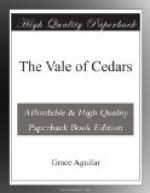Arthur’s first impulse was to press the precious letter to his lips, and gaze upon it till every letter seemed transferred from the paper to his heart; his next was to sit down on the nearest seat, and bury his face in his hands, actually bewildered by the flash of light, which with those brief words came. Disguise—exertion—could it be possible? Nay, it must be! The soft touch of that little hand, the speaking look of those lovely eyes, again thrilled through his very soul, and he knew their meaning now. Mysterious, bewildering as it was, the novice, the poor, exhausted, seeming boy—was Marie! Again he owed his life to her, and the wild yearning to gaze on her again, to clasp her to his bosom, to pour forth his gratitude, to soothe and shield, became so painfully intense, as almost to banish the joy, which her rescue from danger ought to have occasioned. Had it not been for her refusal to bear witness against him, not even the month’s grace would have been allowed him; he would have been executed at once. She had saved him then—she had saved him now! And his heart so swelled he knew not how to contain its fulness, how to calm it down, to wait till the Queen’s further pleasure should be known. But hope sprung up to give him comfort; Isabella would accomplish her intention of conversion; Marie could never resist her, and then—then, oh! she would be all, all his own, and life shine, for both the brighter, for its former tempest clouds. Meanwhile, he had such sweet thoughts, such lovely images, to rest on. He owed his life, his honor, to her; and he thought that it was his devoted gratitude which so deepened love. How sweet is such illusion! how refreshingly soothing to be grateful, when the object of that gratitude has been, and is still, the dear object of our love! How often we deceive ourselves, and imagine we are experiencing the strongest emotions of gratitude, when, had an indifferent person conferred the same benefit, we might feel it indeed, but it would more pain than pleasure; and be an obligation, so heavy that we should never rest, till in some measure, at least, it was returned. How contrary the impression of benefits from those we love!
Never before had the appearance of the Queen’s confessor, the stern, and some said cruel, Torquemada, been hailed with such excitement. He was speedily informed of the late transactions, and his counsel most earnestly demanded by both sovereigns. He required some days to deliberate, he said, so momentous and important was the affair; and when he did reply, his counsel was entirely opposed to what many hoped, and Ferdinand expected. Indignant as he declared himself to be, at the abuses in religion, he yet put a strong and most decided negative on the royal proposition, of utterly exterminating this unlawful tribunal. With all his natural eloquence, and in most forcible language, he declared that, if kept within proper bounds, restrained by due authority, and its proceedings open




